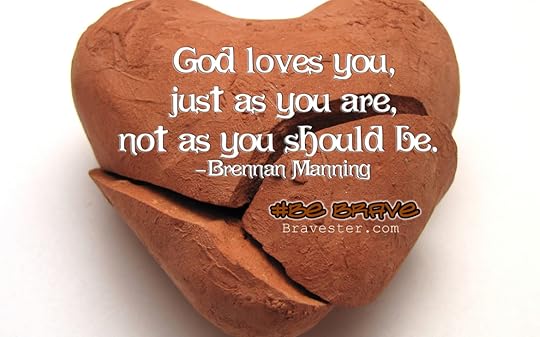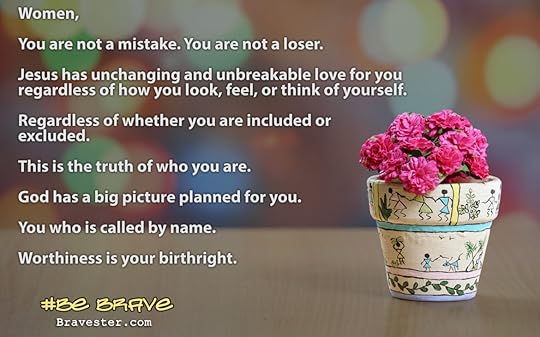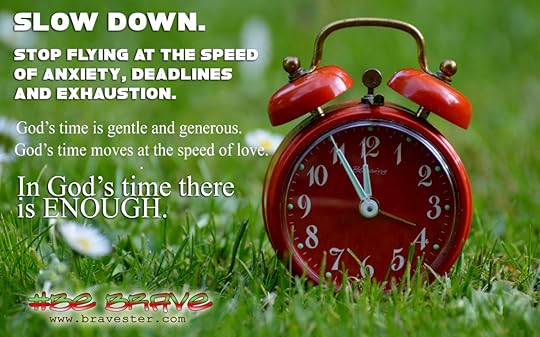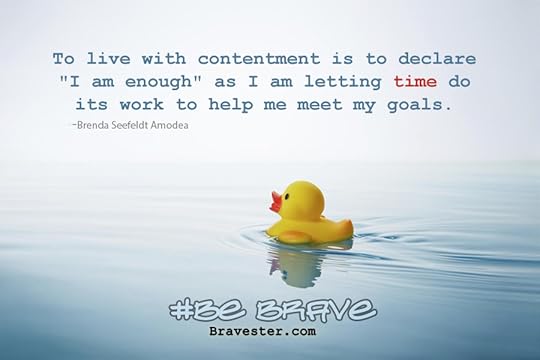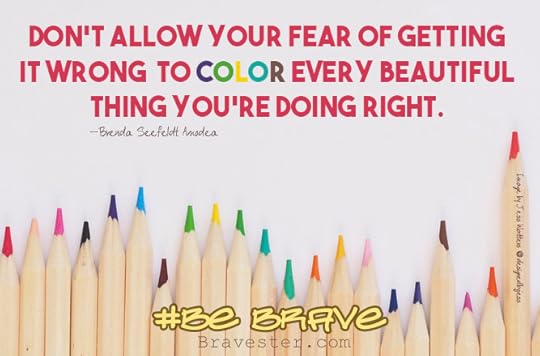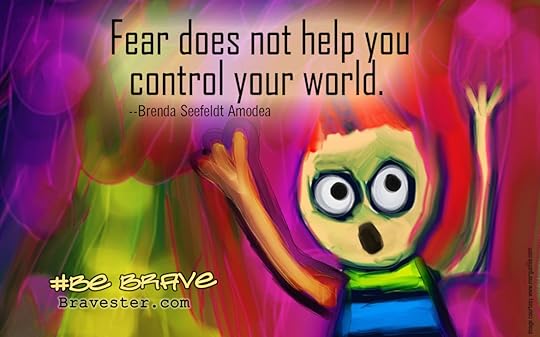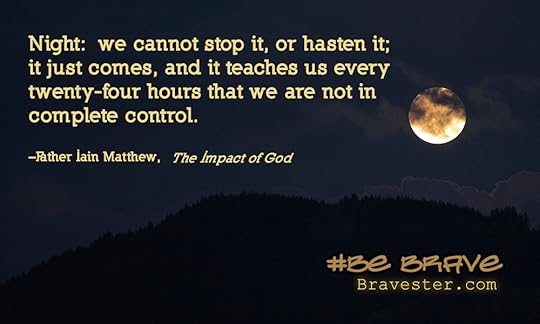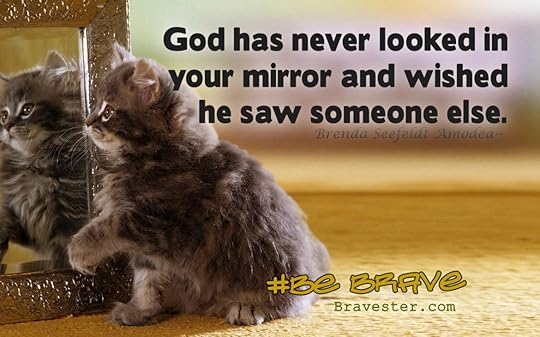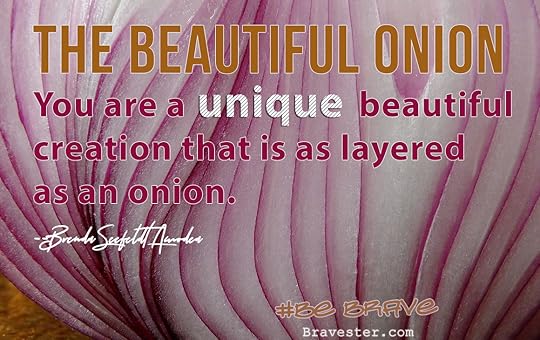Brenda Seefeldt Amodea's Blog, page 19
December 2, 2021
I Screamed at God Again. I’m Learning.
O Lord, how long will you forget me? Forever? How long will you look the other way?
Thus begins one of my favorite psalms, Psalm 13. Because this is how I have prayed very often. I’m not ashamed to admit this. My 40+ year brave faith still finds me praying like this.
I’m not afraid of being honest with God. He gets all of me.
This 6-verse psalm then ends with this: But I trust in your unfailing love. I will rejoice because you have rescued me. I will sing to the Lord because he is good to me.
How in just six verses did David the Psalmist go from declaring how distant and not-listening God is to declaring of rescue and that God is good? Especially how could David declare that God is good while still abandoned?Because David chose to interpret how his life turned by God’s love rather than to interpret God’s love by his life’s circumstances.
I am learning to do this. I am learning to trust the Promiser. When my brain wants to lead to suspicion instead of trust (our brains do this), I choose to trust.
Because I am learning that God is love. Not circumstantial love. Not conditional love. Not earned love. God is love. Memorize this verse, 1 John 4:8, But anyone who does not love does not know God, for God is love. Or just memorize God is love, 1 John 4:8. Love begins somewhere and it begins with God. No circumstances, no conditions, no earning attached to it.
So God is love and thusly loves me as this beautiful creation so where is he in the pain that my life has taken?
This I am learning.
Psalm 13 is 6 verses that can be divided into three stanzas of two verses each:
The problem (vv. 1-2)The petition (vv. 3‑4)The praise (vv. 5‑6)The problem is declared very clearly in vv. 1-2. See above.
For the petition David declares something less emotional, maybe even a bit rational as, I believe, he starts remembering that God is love and that this love hasn’t really left him. Turn and answer me, O Lord my God! Restore the sparkle to my eyes, or I will die. (Okay, maybe an exasperated emotion of death isn’t rational.) Don’t let my enemies gloat, saying, “We have defeated him!” Don’t let them rejoice at my downfall.
I know in my life after my emotional outbursts to God (too often not in complete sentences) that I do begin to remember that God is love in that vulnerable moment. It takes me being vulnerably raw with God for me to remember this deep truth that does not change.
When I’m hustling to cover up the pain or when I’m rationalizing to protect myself from the pain, I don’t get these truthful moments.I get it, pain hurts. Life has hurt you. Again. You’d rather hustle or rationalize over the pain rather than state once again, “pain is my beginning.” I’d like to remind you that pain is only the beginning, there will be a beautiful ending.
Then comes the praise in vv. 5-6.
Note that in these six verses that David’s life circumstances had not changed from what led to David’s emotional outburst to start with. David was still hiding in caves, Saul was still on the throne. Saul was still trying to kill David. This didn’t change during the writing/singing of this psalm.
So what did change? David chose to interpret his life by God’s love rather than to interpret God’s love by how life was leading him. David chose to lean towards trust instead of suspicion. David made small, deliberate tweaks to his thinking because he chose to give God more credibility than everyone else.
I’m sure David’s trust issues were triggered but he chose to trust in God’s love.
Here’s a story of preacher lore. The famous preacher, Charles Spurgeon, was walking through the English countryside with a friend. He noticed a barn with a weather vane. At the top of the vane were the words, “God is love.”
Spurgeon remarked that this was an inappropriate place for such a message because weather vanes are changeable but God’s love is constant. But Spurgeon’s friend disagreed. “You misunderstood the meaning,” he said.
“That weather vane is stating the truth that no matter which way the wind blows, God is love.”
My faith leads me to pain and anger, emotional outbursts, and doubts as well as rich joy, deeply-felt memories, and personal moments with God. I am learning that no matter which way the weather vane of my life blows, God is still love. God is still for me.
I am learning to trust that.
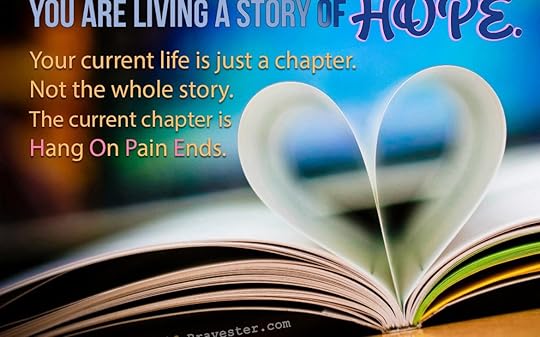
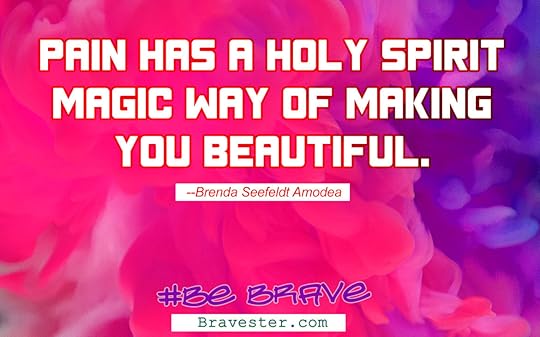
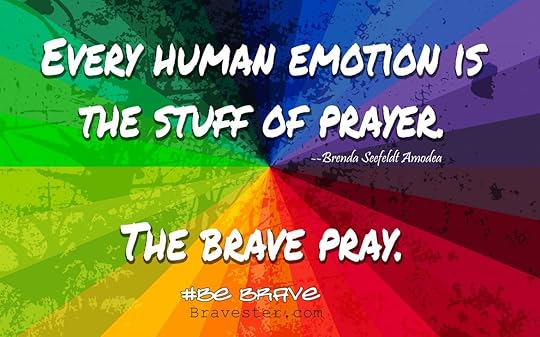
(I couldn’t decide which one meme was the right “amen” for this article. I’ll let you choose.)
The post I Screamed at God Again. I’m Learning. appeared first on Bravester.
November 30, 2021
Memes to Share About the Hope of Pain.
Brave decisions are made by those who are not afraid of their pain.
What a true statement that doesn’t make the pain go away. Living wholeheartedly means that pain is your beginning. Healing rarely comes without pain. Pain so often feels like the end of something, probably because something did end. It is the brave who can see this as the beginning…and that the other side of the pain will be a grand brave story.
Even this truth doesn’t make the pain go away. Your life simply hurts. You are not alone in this pain. You are joining the many of us who have broken-hearted bravery.
Spread the hope of pain with these memes. Invite your people to not be afraid of their pain. Or to hide in their pain. Give them the truth.
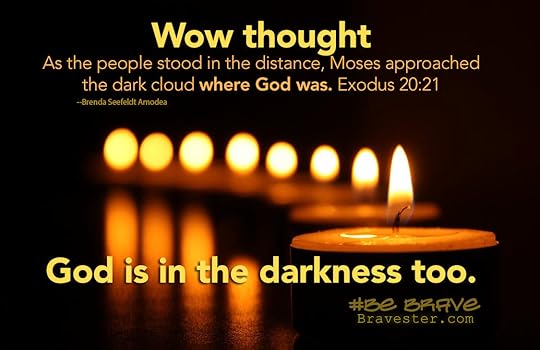
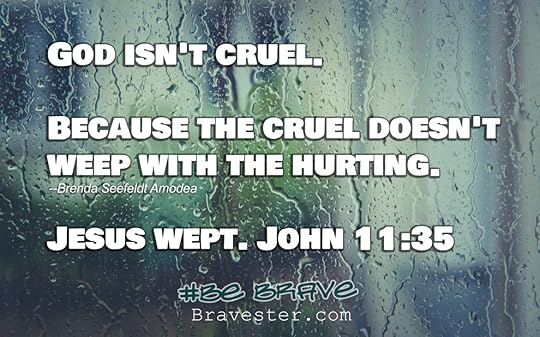
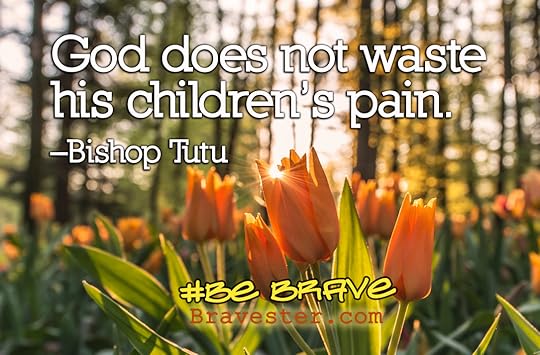
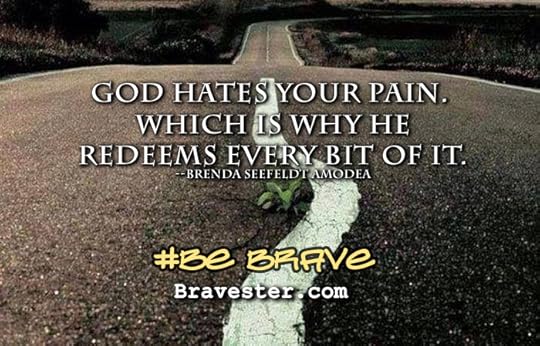
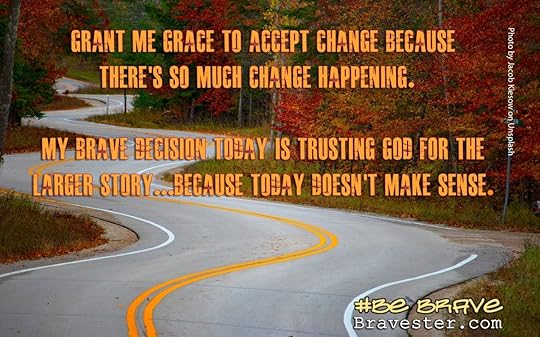
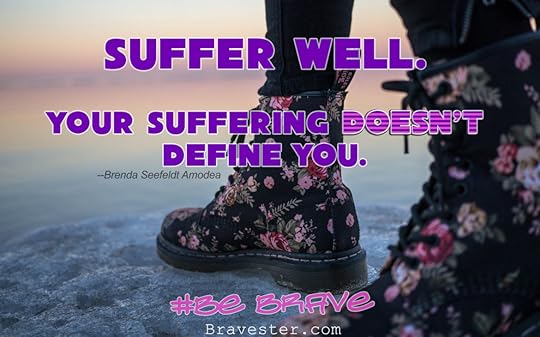
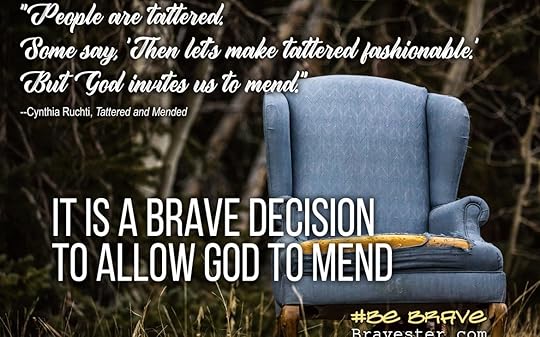
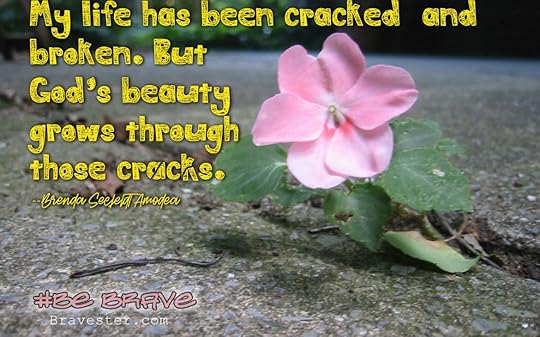
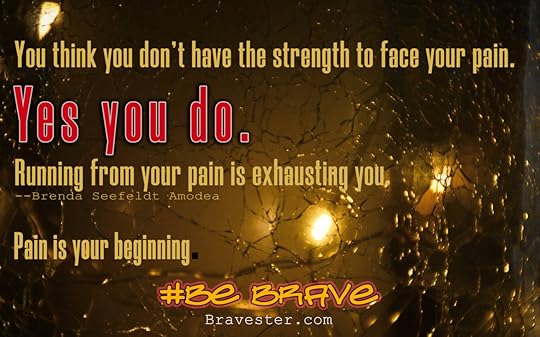
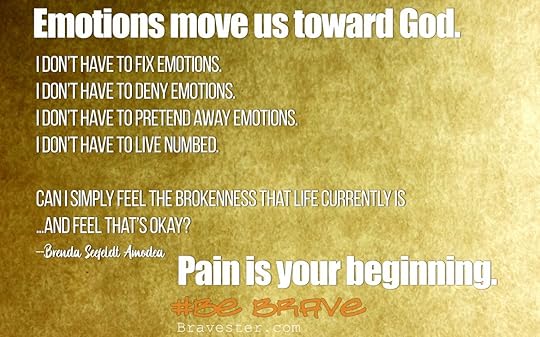
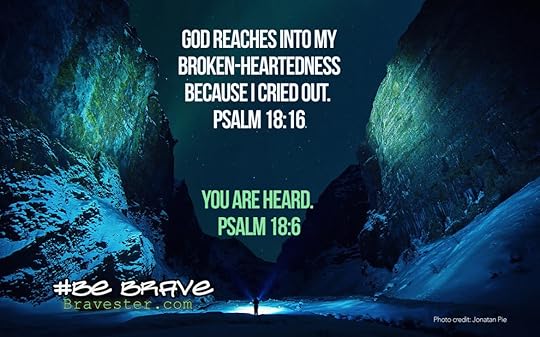
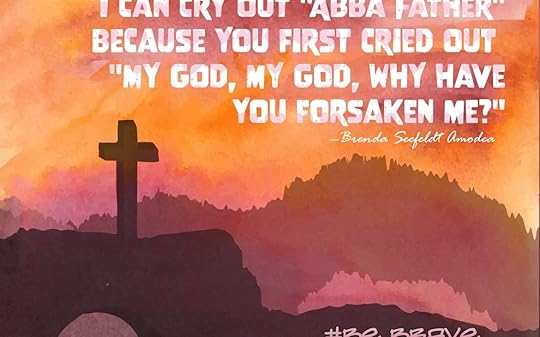

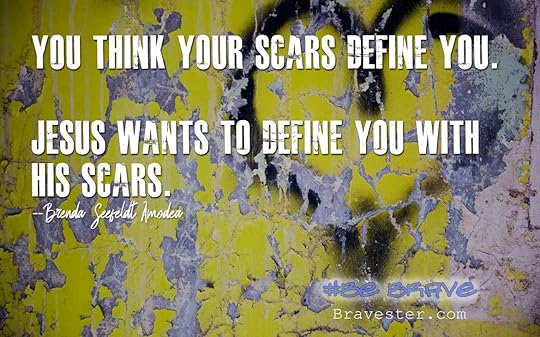
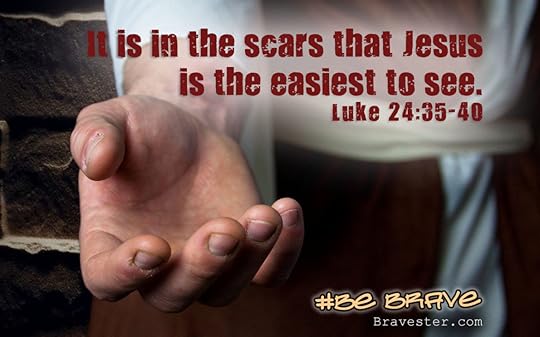
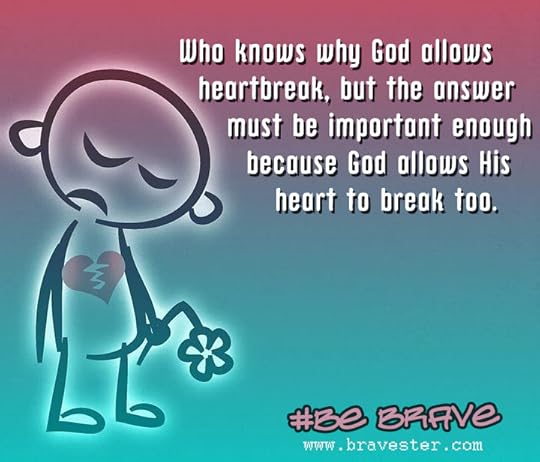

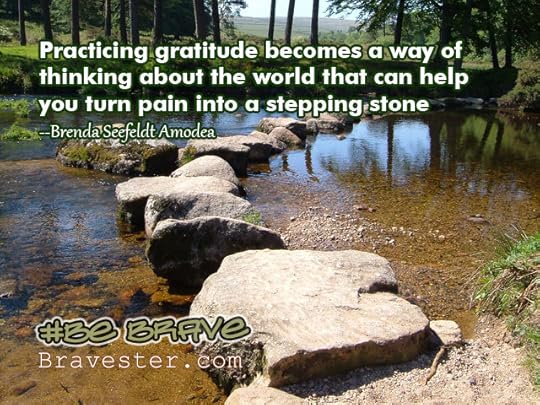

The post Memes to Share About the Hope of Pain. appeared first on Bravester.
November 24, 2021
Friendship in All of the Beautiful Seasons
God has a pattern of working in cycles: seasons, the moon, insects, cell reproduction and many more such examples. Hence our lives also have a pattern of working in cycles. Which means nothing lasts forever. Change is constant. (Which is really an ironic sentence.)
This is so true when it comes to our friendships.
Our friendships feel giddy like spring, make memories like summer, have the tenacity of fall, and sometimes experience the death of winter.
It is rare to have 40-year friendships, like I’ve had the grateful privilege of in my life. These friendships are the gifts who define me.
Even with lifetime friends there is always a next time in friendships. There is always a next season. When I come to understand this better, I can better embrace the vulnerability of friendship and value the season we are in.
 Winter
WinterWhen friendships run through their seasons, the ending hurts. As it should. That person is walking away with a vulnerable piece of you. That person knows you, and some secrets too. This friend was your safe person who knows your vulnerable stuff. There was an understanding that you would go the distance and this hurts.
The reason for the ending could be one of a million reasons. One of you could have moved; you changed churches; your children entered a different stage of life; you changed jobs. Yet because this is such a vulnerable loss, it feels like you were rejected. The pain lies to you that you did something wrong or that something is wrong with you. Pain lies and hides the truth that this friendship was a season.
This loss still hurts. This is a worthy loss. The loss you are feeling is real and honorable. It is worthy of proper grief.
Maybe instead of feeling proper grief you have minimized this loss by excusing the pain as just a friendship loss? So you moved on too quickly. You got “over it.” You rebounded with your new group of friends. You ignored the pain of the loss. You redefined the importance of that friendship. (Please don’t do this.)
Isn’t the process of grief to honor someone because she was so loved and so valued? My grief over broken loss is worth every minute of the great love we share, now shared. Grief honors this friendship that is now over.
Without recognizing that you are going through the process of grief you interrupt your healing and you minimize the value that this friendship had on the formation of you. This was not just a friendship.
This person is a part of your history; is a part of your formation; shares your memories; and maybe even carried your pain when you were too hurt.
She is now gone but she is still a part of you. This does hurt. This is worth grieving.
Friendships are very important.
 Fall
FallI grew up having very few friends. My year-younger sister had loads of friends. Too often my friends were her friends but I was only receiving the leftover attention. How I desired to have a best friend.
I find it ironic that now in my later years I have multiple friends whom I met in 1977, 1981, 1983, 1984, and 1985. These people are my people supporting me through this wild life God has led me on. (My sister also has friendships dating this far back and many more friends still. It still is what it is.)
In all of these very lengthy friendships of mine we’ve had seasons. Sometimes our lives synced up for living everyday life together. Sometimes there were seasons we didn’t talk at all because space was needed. We’ve had everything else in between.
Even when we were in conflict, I knew I could make the phone call asking for help. Sure enough, our seasoned friendship was the comfort I needed to get through. I say “sure enough” on purpose. I was sure she would be there for me.
Friends like this are so beautiful in their brilliant colors. As the life-giving parts of the tree are drawn inward to prepare for winter so it is as my life grows and changes. These are my people. These people hold my story.
 Summer
SummerFriendships are very important.
I need to be in a vulnerable relationship with somebody. I need encouragement. I need cheering on. I need to be told that I made the right choice. But here’s the thing. Not just anyone can tell me that. For it to sink into my calloused heart it has to come from people who know that calloused heart. This knowing comes from my feeling safe enough to be vulnerable.
These vulnerable relationships for me often include more than one person. I trust certain people which then allows me to lead the rest of my life with a bigger and braver faith.
Your perfect best friend may actually be the combination of five of your friends. Especially as your life grows. Because your life is now so much bigger than that 5th grade classroom.
Who should these five friends be? The options are wide because your life is wide. One may come from work. One may come from your small group at church. One may be a cousin. It is in this wide combination that you will figure out how surrounded you are by friendship, love, and support. This combination of friends from the many areas of your life is enough to support you, giggle with you, be wise with you, and carry you when life becomes too much.
I do have some opinionated wisdom about who some of these five friends should be. I think one friend should be someone who is older than you. Find that sassy, wise (in both Biblical wisdom and life wisdom), and beautiful older person who you can learn from. The one who also recognizes you and will speak into your life words of mercy and truth.
Find another friend who is younger than you. Maybe you are not that wise friend yet (though you may be sassy!). But you do have some wisdom to contribute and you are able to recognize what God is growing in this younger friend. You do have words of mercy and truth to share.
I also know I am very capable of being an imperfect friend. I know me. I need to remember that when I feel hurt by my imperfect friend.
 Spring
SpringI expect friendships to bring me joy which means I willingly accept the risk that I am going to be hurt. Joy and pain are perfectly matched together and I get to have both. The risk is worth it to meet beautiful people who may become important people in my life.
I have qualities who I look for in friends. Someone who inspires me. Someone I believe I can respect. Someone who will respect my boundaries. Someone who does not need me to complete her. Someone who I trust will not be afraid of my pain.
There are givers and takers in springtime friendships. Givers ask to earn trust and allow the time needed for that trust to be earned. Takers will demand your trust as a condition of their friendship. The trust is for their benefit, not yours. You must vulnerably try to figure out who is a giver or taker.
Be wary of the love bomber friend. You will discern early that something is off with this new friend as you also will love the attention you are receiving. Until you realize that this love bomber friend is really trying to control you to avoid her vulnerability.
Love bomber friends expect you to return this same attention back, whether you are capable or not. Whether you realize it or not. When the love bomb is not returned, the love bomber friend is disappointed, sad, and very likely angry because you have unknowingly repeated back to her the small story she is telling herself–that she is not worthy of love. All because in the navigation of springtime friendships you didn’t measure up to a mark you never knew about.
Failure happens often in the making of springtime friendships. This means I must vulnerably and awkwardly try to make friends. I don’t know which part I hate more.
This is also the beginning of friendships. Friends who will make memories with me and be a part of my history and part of my formation. I wrote in my book,
“My life is a story of getting my heart smashed and the many times I have chosen to get up.
“I have never gotten up alone. There have always been people beside me–sometimes carrying me–until I’m able to be up again.”
These people who are not afraid of my pain are the faith holders of my life. Who I am is attributed to them.I had to go through the vulnerable and awkward to become friends with them. So worth it.
Thank you, my people. Thank you for all of these beautiful seasons.
Photos by Sorina Bindea, Timothy Eberly, Meri Sorgaard and Maria Lupan on Unsplash.
The post Friendship in All of the Beautiful Seasons appeared first on Bravester.
November 4, 2021
Creating a Family Legacy Starts Now
We are a family who…
How would your teen answer this question?
…goes on camping adventures.
…on Thanksgiving served the meal to the homeless.
…eats dinner together as often as possible. For special dinners we light candles at the table.
…planned together and went on big hiking adventures together.
…watched every Marvel movie opening weekend.
…did a book club together.
…had a special birthday plate for someone’s birthday.
…baked Christmas cookies for every neighbor. We had a huge production line of cookie making.
…did a summer mission trip together five years in a row.
…goes rollerskating every Sunday. (My son is actually doing this with my two grandchildren.)
Or would the story your teen tells about your family be…
…was overscheduled.
…alone with our screen time.
…went to all of my games but I don’t think my parents really wanted to be there.
What story are you choosing to tell with your family?To do this intentionally and with priority is giving your teen a gift. You are giving them an identity. This is who my family is. This is who I am. This is who my family believes I can be. As you know, one of the important identity markers of adolescence is answering the question of “who am I?”
Think about your beloved teen being 25-years old and experiencing an existential crisis, because this happens. A job has gone bad. A relationship has ended. Loneliness is overwhelming. Your beloved can think back to this identity forming time and think, I come from a family who rollerskated together. I have good memories. I have people who want to be with me.
This is your gift for that time. Alongside your prayers; your phone calls; giving your beloved the appropriate space to fail; and listening well and knowing when to not speak. These things can make you feel so unsure as a parent as you watch your 25-year old struggle. But if you have given them this family story—or legacy—you can have confidence in that.
Hence you start this now. And you bring your faith near to this story you want to create.
You can teach your faith to your teen. You can do the daily devotions and daily prayers with your teen. I do suggest this because there is an everyday-ness to faith. But you do know that a living faith is more caught than taught. A living faith becomes contagious when faith fits into this beautiful story that is lived.
You feel inadequate passing on your faith to your teen? Intentionally create your family story and bring your faith alongside of it.Because one hour on Sunday church attendance is not growing faith in our teens. Sadly, youth group attendance is not doing so well either. We so dearly want our teens to take their faith decisions into adulthood.
Two tips for this family legacy you will be creating:
This plan doesn’t get sacrificed for another schedule. Sports takes second. Youth group takes second. You are a family who (you fill-in-the-blank) and that is the story you will tell with your schedule.Give your teen some ownership in this legacy. Say you try serving Thanksgiving dinner at a homeless shelter. Sit down and have an honest conversation about how your teen felt about it? Did he/she miss time at grandma’s? Did he/she miss your Thanksgiving stuffing? Is this something he/she wants to do again? Tweak and get buy in and plan for the next time. And the next time. May this be something your beloved tells his/her friends about for the next 40 years. And then does with his/her own children.You can start this now. Start brainstorming.
Bonus question: What would answer to that question about your own family growing up? I came from a family who…
The post Creating a Family Legacy Starts Now appeared first on Bravester.
Stresslaxing
This Religion of Enoughness has given us a new word. A word that way too many of us are identifying with. Even giggling about.
Just when we think culture is doing away with religion (aren’t we more spiritual these days?!), our bodies need us to have a religion. Our DNA is wired this way. So while we bash the religion word, our body is doing whatever our body does to keep us in religion.
This news is not good for our bodies.
This new religion that has been created is hard on our souls, hearts, and bodies. This religion is very popular and exhausting us—as every religion of works is. I’ve named this the Religion of Enoughness.
Which now gives us the very popular “stresslaxing.”
Can I be present with those I love right now—in the present—and not be thinking and stressing about my to-do list?Can I read that good book and not hustle for the next 3 hours after I took that break?Can I stop hustling? That is one question. Can I stop feeling shame when I don’t hustle?Is this your struggle?
We have come to believe that our work is our worth. We even believe our work is our worth and thusly earns God’s love. Just read many of the top “Christian” books these days. The message is there in funny stories and clever words telling us that this is a way to live your faith.
There is a different kind of best seller Christian book that opens with these beautiful words:
“We learn much in the four Gospels about Christ’s teaching. We read his birth, his ministry, and his disciples. We read of his birth, his ministry, and his disciples. We are told of his travels and prayer habits. We find lengthy speeches and repeated objections by his hearers, prompting further teaching. We learn of the way he understood himself to fulfill the whole Old Testament. And we learn in all four accounts of his unjust arrest and shameful death and astonishing resurrection. Consider the thousands of pages that have been written by theologians over the past two thousand years on all these things.
But in only one place—perhaps the most wonderful words ever uttered by human lips—do we hear Jesus himself open up to us his very heart:
“Come to me, all who labor and are heavy laden, and I will give you rest. Take my yoke upon you and learn from me, for I am gentle and lowly in heart, and you will find rest for your souls. For my yoke is easy, and my burden is light. (Matthew 11:28-30)
“In the one place in the Bible where the Son of God pulls back the veil and lets us peer way down into the core of who he is, we are not told that he is ‘austere and demanding in heart.’ We are not told that he is ‘exalted and dignified in heart.’ Letting Jesus set the terms, his surprising claim is that he is ‘gentle and lowly in heart.’
“…Who could have ever have thought up such a Savior?” –Gentle and Lowly: The Heart of Christ for Sinners and Sufferers, Dane Ortlund, pp. 17-19
Who is putting the expectations on your life? Who is pushing you to keep up?
It is not Jesus. It is not the way of Jesus.
Those are some soul-searching questions for you to take some rest and ask yourself.
This is not a moment to laugh at our new creation of “stresslaxing.” Take some rest. Listen to your soul. Your soul wants to be felt and seen by Jesus who is gentle and lowly. You feel that, don’t you?
Rest is a gift, a pure gift. There is no need to try to “perfect” it to please God. He is already pleased and nothing you do or don’t do can change that reality. (This may be a big view of God you haven’t thought of before. We talk about this God a lot on Bravester.) Rest is a way of loosening the grip. It’s an invitation into an identity that is free of enoughness.
Something for you:
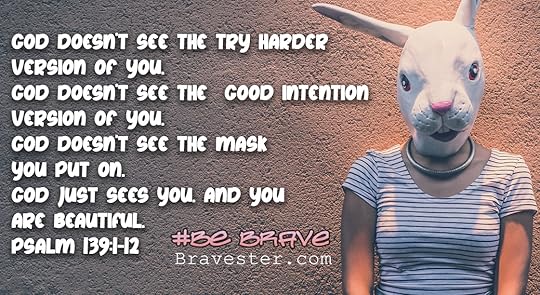
Hello, beautiful.
The post Stresslaxing appeared first on Bravester.
October 22, 2021
I am Exhausted from Joy
Take that 2020! As I continue to figure out how my life will change from the Year-Plus of the Pandemic (will it ever end?!), I find myself exhausted with joy.
Once this whole pandemic thing started I recognized life as we all knew it was changing. There would be a before and an after. Change, specifically transition, would need to be embraced. My life would be changed as well as everything in the world around me.
May I quote my favorite book again?
“So here I am. I’ve figured out what these clothes mean—and don’t mean—and I’ve managed with some difficulty, to get myself dressed and out onto the dance floor. But would you believe it, halfway into the first number some jerk cuts in on me?
“Standing once again along the wall of the gymnasium, where I’ve stood before for different reasons, now licking the wounds of my damaged ego, I inquire as to the name of this intruder, and I find out his name is Life. They tell me he often cuts in on dancers. They also say that when he cuts in, he always cuts deep, so deep that it’s almost as if you have been cut in two and one part is left staring at the other, both open and vulnerable. They say this knife can go all the way to the dividing of soul and spirit, joints and marrow, and that it can even judge the thoughts and attitudes of the heart.” –John Fischer, Real Christians Don’t Dance, P. 81.
Dang life. That’s 2020 and 2021. And lately I’m doing a lot of joyful dancing!
My one son is communicating with us again. They are one-sentence emails but it is something! One of his one-sentence emails says he loves us.
We have a new grandbaby. Grandbaby #6. Just when our youngest grandchild starts kindergarten here comes a new life. Being Oma is this entirely different kind of joy. It is hard to put words on it.
 Anthony Neill
Anthony NeillIn the midst of the pandemic, John and I started a church. That’s a crazy brave story so we named our church Larger Story Church. Beginning in the pandemic will always be the core of our story. So take that 2020!
In just our first year we have seen incredible growth inside of our church family. I’ve been doing church work for 40 years now so when I say I’m seeing incredible growth know that I’ve not seen this in my previous 39 years. Not like this.
We are a hybrid church which means we use Zoom to meet together as we are also slowly growing to gather in person again. Except over half of us join from 3 different time zones. We will always be hybrid.
During Covid we used our home to Zoom out of and only our bubble was invited to worship in our home with us. Slowly we’ve opened that bubble and now our home is full. Good problem. We had to start looking for a larger space to rent. More importantly we need to set up all of our media equipment permanently to better the Zoom experience. This good problem is such a good problem because one of our members have offered to pay the first year’s rent!!!!!!
All of this. This is the kind of joy you need a nap for. I’m exhausted.
James 1:2 paradoxically tells us, Dear brothers and sisters, when troubles of any kind come your way, consider it an opportunity for great joy. Here joy is mixed with our pain. The truth is we are hardwired to make it through pain and we also get to feel joy. If you numb yourself from the pain, you will also protect yourself from the joys of life. This follows a truth from Dr. Brene’ Brown’s research, “We cannot selectively numb emotions, when we numb the painful emotions, we also numb the positive emotions.” (Daring Greatly: How the Courage to be Vulnerable Transforms the Way We Live, Love, Parent, and Lead, p. 137)
I have felt both. I’m not afraid of my pain but I may be afraid of my joy because I’m so tired!
Anne Lamott has said, “Joy is the best makeup.” At least I look good!
It’s nap time.
Sometimes naps are required in a brave life.
The post I am Exhausted from Joy appeared first on Bravester.
October 9, 2021
The Mask You Wear and Your Destiny
(Listen…your destiny is still crying out in your soul.)
We all have thousands of reasons for wearing a mask. But if you can find the bravery to take it off—at least with your people—you will find that ache of destiny arising out of your soul.
Who are your people and why your people? Read the many articles linked below. With your people with you even your unhealthy church of good intentions can be manageable. (This is my story too.)
When your mask comes off, your shame can heal.
When shame speaks: “My guess is, I stopped believing God had anything significant for me. That there are certain people whose lives count and I’ve compromised or squandered my talents enough that nothing significant would ever happen to me.”
But healed shame feels like: “It’s like answering your front door to discover that beautiful high school girlfriend you thought rejected you is now standing there, all these years later, telling you she’s still in love.”
Those quotes come from p. 83 of this book, The Cure. It is a clever parable story that teaches layers and layers of what our faith as a Christian is. Check out the teaching series by me which you can use as a small group series.
We all can dream about what healed shame feels like! This is a scenario we sometimes even dream about. There is something about first love.
When we allow ourselves to dream again, the overwhelming and self-sabotaging questions then fill our minds with how can shame be healed? How can I feel this way again?
Because there was a time we did feel this way. When we were younger. You knew you were created for something special. It was breathed into you at birth and you knew it.
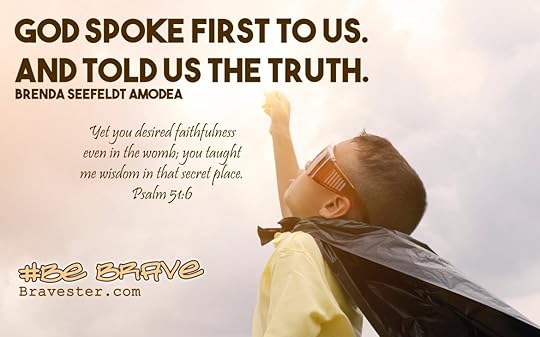
Then life broke you.
Every once in a while you now feel that ache that you were created for something special but you press it back down. You’ve compromised too much. You squandered your talents. That moment has passed you by. It is too late.
It is not too late. In God’s world it is not too late. Your reconciliation to God also reconciles you back to the destiny you were born with.Truly.
These are some notes on destiny, not from my wisdom. More wisdom from this book, The Cure, all found on pp. 85-86.
“Destiny is what happens when those God-given desires, mixed with my particular gifting, are allowed to be healed, matured, and released to freely give away. This is where this whole book has been heading.”“Destiny is the ordained intention God has sacredly prepared with your name on it.” When you read that, did something ache inside of you? Because you’ve always known that no matter how much life has broken you. No matter how “crazy busy” or numbed or distracted you have kept your life.“Don’t be afraid of this feeling of matching up with your destiny.” Something is awakening inside of you. “When our worldview shifts to enjoying Jesus rather than focusing on not sinning, we mature. In the process of maturing, our eyes open to others and we become aware of many more opportunities to love than when we focused on our issues.” The parable story is about two rooms, The Room of Good Intentions and the Room of Grace. One keeps you busy with sin management, one matures you. (Read the book! Have a small group with our video series!) Can you guess which one helps you enjoy Jesus? “Unhealed wounds require our attention and we will have trouble focusing on others while those wounds still need attention.”“Mask-wearing will never get us to our destiny. Masks keeps us self-centered, immature, and unavailable to others.”“God’s goal for each of us is never simply healing or safety or rest or even receiving love. His goal is that we’d be released into the sense of purpose we haven’t been able to shake all of our lives.” You deeply know this, right? This just pinged that ache again, right?“We’re also learning to live with a community of people who trust God and others with what is true about them. We discover we’re part of a destiny bigger than our own. While we have an individual destiny, the community we are a part of also has a destiny, and we are intertwined with it.”Has this ache been reawakened enough to set you in a direction of healing? I hope you have been brought to a crossroads where you recognize this ache and this ache allows you to ask the hard questions and to be open to someone other than yourself for the answers. That you will call out to God because he drew you to this crossroad.
At this crossroad you will find this choice. “I’m staring at this intersection, like this could make it go away. That’s when I notice the tall pole with two arrows at the top pointing down each fork. What’s written on them is even more confusing than the fork. One arrow, pointing left, reads Pleasing God. The one leading right reads Trusting God. You’re kidding. I’m supposed to choose between these two?”
That is from page 2 of The Cure. Ask the questions and just walk forward. (That’s from the end of the book).
It is not too late.
And take off that heavy and uncomfortable mask. Because only that mask is receiving love. (That’s from the book too.)
Bonus reading on how to find your people:
But People…You Still Need the Gift of People
The Connection Needed So the Rest of Your Life is Manageable
I Need to Be in a Relationship with Somebody Vulnerable
These Are the People You Want in Your Brave Life
And of course, this book I Wish I Could Take Away Your Pain. This is my story (though in small book size) about my people who carry my pain. Includes 3 pages of those things you don’t want to do.
The post The Mask You Wear and Your Destiny appeared first on Bravester.
October 7, 2021
I think we have to keep trying to love life even when it hurts our feelings.
February 21, 2015
Very recently I was in pain. I was watching my son spin out of control yet again. Yet again I had that wish for him to get arrested so that I would know he would live. This is a fear I have felt all too often but it is a fear that has been absent for two years. Having that fear come back—feeling that fear again—spiraled me downward.
This is living vulnerable. And there are times it hurts. Hurts a lot.
This is where bravery comes in. I have chosen him to be my son and that does not change no matter what level of pain or joy. He is loveable. He is so worthy of this love. (I wish you all could know him. You would see it too.) He is a beautiful boy, now man.
Note: He has brought me such incredible joy. I would never be able to feel that joy if I wasn’t able to feel this pain. If I numb the pain, I will also numb that joy.
This is living vulnerable. I feel. There are times I have to keep trying to love life even when it hurts my feelings.
While spiraling downward, I called out for prayer and action. I could see this all in my mind’s eye. I saw myself spiraling downward. I made a declaration to my husband that I was not going to crawl into bed and lose two weeks of my life again. I saw myself reach out to my church family and cling to them with hands clasped asking for prayer and action. Then I chose to continue on with my days. There were times I froze in place lost in despair. Then I would choose to continue on again.
He’s stable now. He has a big hole to climb out of. But he’s in a place where he can. With people who will walk with him through everything. Everything. Thank you to the many who have decided to continue to love life even when it hurts our feelings. Moms can’t always be the answer. But God’s people are. To the many who chose to chase him, you chose bravery to love him. Of course, it wasn’t a hard decision to love him. He is so loveable. Thank you for choosing bravery.
I wrote this before I started Bravester. Such words have always been “falling” out of me. If you’ve followed me for long, you will know that this story only got worse.
This was also written before I wrote my book about these people who have helped me carry my pain. This mom would not be possible without surrounding herself with brave people. These are my gift of people. This is my story which is weaved throughout Bravester.
Our best choice is to keep trying to love life even when it hurts our feelings. I’ve also learned since then that all emotions move us towards God. I feel—the pain and the joy—and then I make decisions about those feelings. I’ve grown to not be afraid of my pain. I’ve also become exhausted from so much joy. I don’t make the decisions that cause me to numb the pain. That only leads me to make too many other decisions—often tinged with regret—down the road.
So life has hurt my feelings…again. I’m going to make the brave decision to love life anyway. To find the gratitude. To have a yellow world. To cry and whine with my people and then go live this life. When I know I’m heard by my people the rest of my life is so much more manageable. I don’t need to live fake and I don’t need to be that tragic friend of yours who cries and whines all of the time. My people have heard me and I’m choosing to love life.
This is Bravester thinking. Because obviously by my long life, life is going to hurt my feelings again.
The post I think we have to keep trying to love life even when it hurts our feelings. appeared first on Bravester.
September 30, 2021
Memes to Share About the Truth of Being Enough
September 28, 2021
A Written Prayer for the Racial Injustice We Now Refuse to Unsee
“After three white police officers beat a Black man named Robert Hall to death, a federally commissioned panel issued a 178-page report on America’s police “failings” which found that while both white and Black people suffered from police brutality “the dominant pattern is that of race prejudice.” According to the report, Black Americans “have been shot, supposedly in self-defense, under circumstances indicating, at best, unsatisfactory police work in the handling of criminals, and, at worst, a callous willingness to kill.”
“This is all sadly familiar to anyone who’s been paying attention, but there is one small surprise here. This report was issued in 1947 and the panel was commissioned by President Harry Truman.
“It changed nothing, as you’ve probably noticed. The sheriff who killed Hall won his reelection as the wrongful death case moved through the courts. Thus began America’s long history of detailed research on racist police brutality. These studies inevitably confirm that police brutality disproportionately affects racial minorities in general and Black Americans in particular. Often times, these studies even find possible solutions for how to curtail the blight of racist police brutality. Truman’s report did so nearly 75 years ago.” https://www.relevantmagazine.com/justice/social-justice/when-will-america-take-what-we-know-about-racist-policing-seriously
Sheesh. Really?
Too many of us from the “white church variety” have been unseeing what has been prevalent for a long time. We now can’t unsee it. Thanks to videos on phones we now can’t unsee it. Which means we are now called to “be the bridge” to healing.
When you deal with issues of race, class, and culture, we feel four emotions: grief, anger, fear, and shame. We don’t deal with any of these emotions in healthy ways when things are normal. Things are not normal right now.
The work of reconciliation too often happens at points of crisis when we aren’t equipped emotionally. It is no wonder this issue of justice is a mess right now. Everyone is uncomfortable, and emotional decisions are being made.
For starters, we can pray. I hope we can also embrace the discomfort of the now; notice the systems that have been in place. Just begin noticing them; and have conversations.
From one of our conversations at my church we created this written prayer. At the end of this article there is a pdf download option so you can print this for yourself. #thebravepray
Written Prayer for the Sin of Systemic RacismDear Triune God, Father, Son, and Holy Spirit,
Our eyes are opened, our hearts are broken,
We recognize the systemic racism for generations that has held back so many of our brothers and sisters in our God family.
We feel the emotions of anger, fear, shame and grief but we are not afraid of these emotions. We trust you, God, to use these emotions to bring about healing change.
We want to see healing change.
We trust you as the one who holds the larger story which is full of your justice. This means healing change is coming.
Lead me in my part of the healing change.
We confess that racism is sin. Systematic injustice is sin.
The Apostle Paul talks about principalities and powers.
I pray against these principalities and powers. I join millions of others who are praying.
I also am willing to do my part of the healing change.
There is systematic sin and there is personal sin.
Forgive us, God of Justice, for both.
We pray for the victim. We pray for the oppressor. We pray for the individual who will make the choice as to which one he or she will be.
Overcoming is our birthright as Christians.
It starts at the cross of Jesus.
May each person choose the way of Jesus to overcome.
Peacemaking is our birthright as Christians because we belong to the Prince of Peace.
Peacemaking looks like going to the cross.
Because we have been forgiven of so much—and God has never left us—may we be a part of peacemaking in this unjust world.
We will not dehumanize the other. This is my pledge.
I pray for the teachers of history to teach history that is true.
This may bring the emotions of anger, fear, shame and grief but the truth will set us free. The truth can heal.
I pray against the distortion of truth.
May systemic forgiveness happen.
This will come with humility, meekness, and powering under.
Each of these are leadership traits.
May I lead this way. God help me.
Righteousness and justice are the foundation of your throne. Unfailing love and truth walk before you as attendants. Psalm 89:14.
In this messy middle where I live right now I need unfailing love and truth close to me.
One day historians will tell the story of the Church in this era of pandemic and racial strife.
We pray that historians will find in the rubble of these years of suffering a people who bore testimony to Jesus who never lost sight of those most in need.
I pledge to be one of those people.
The brave pray. I pray and believe in the way of Jesus.
I believe in this larger story.
Amen.

The post A Written Prayer for the Racial Injustice We Now Refuse to Unsee appeared first on Bravester.

